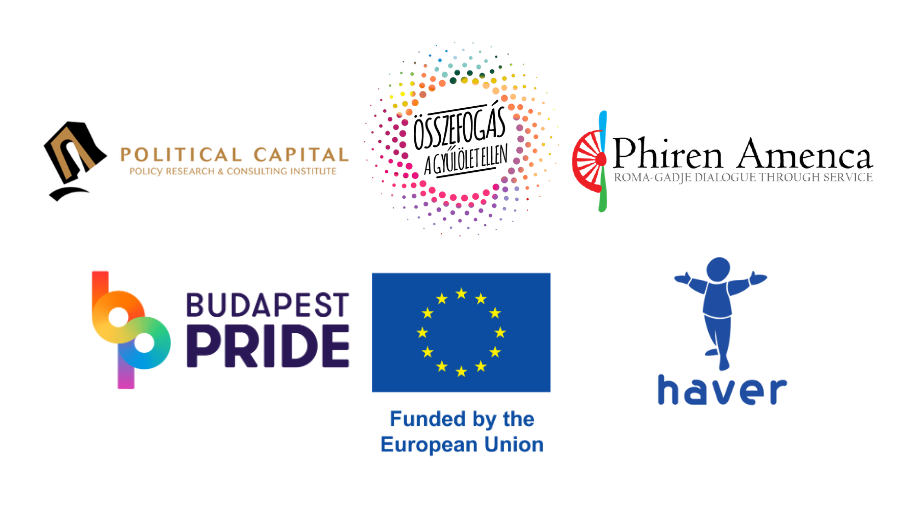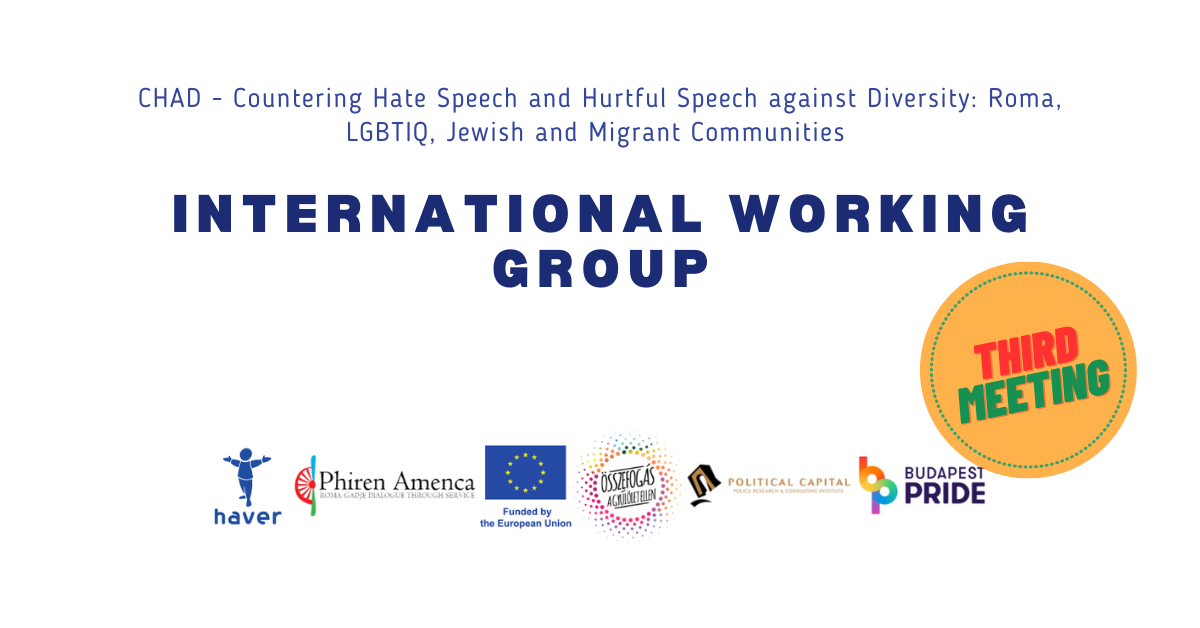February 23, 2023 – Online
The international working group, formed in the frame of the CHAD project, had its third meeting on 23 February 2023. The meeting aimed to gain an overview of the state and scale of hate speech in some of the participants’ countries. The agenda consisted of three presentations covering some aspects of issues related to hate speech in Hungary, Austria and Italy. After each presentation, a small discussion took place based on questions related to the topic. These discussions mostly focused on highlighting the similarities and differences between the hate speech situation in these countries.
Participants of the third meeting included eight people working at organizations dealing with hate speech and hate speech monitoring. Of these, five were Hungarian, and one participant was from Bulgaria, Austria and Italy.
Summary of the presentations on monitoring hate speech online
Hate speech in Hungary
As the meeting coincided with the day of remembrance of the Roma murders, the presentation started by commemorating the serial murders of Romani people in Hungary during 2008-2009. Although the crime series is known as The Roma Murders, it is a deceptive name, as it was Hungarians killing Romanis, not the other way around. The official handling of the case left much to be desired, among others mentioning the perpetrators’ connections to the Hungarian state authorities and the disappointing legacy of the killings. This could have been the starting point of a national discourse about anti-Roma hate speech and its real-life consequences. Not only did this not materialise, but the political party most closely associated with the killers, Jobbik, became quite popular in the next elections in 2010.
In Hungary, the government plays an important role in fostering hate speech. With its vast control over the domestic media landscape, the government picks and chooses minority groups and turns on hatred towards them in line with its political goals. For example, between 2015 and 2018, the main subject of hatred by government-controlled media was migrants, which shifted to LGBTQ people in 2021. These hate campaigns have been mainly built on preexisting notions about minorities.
While antisemitic conspiracy theories are extremely popular among the radical right in Hungary, the government never explicitly whips up hatred towards Jews and actually sometimes condemns antisemitism. Geopolitics may explain this partly, as the government is closely allied with Israel. Furthermore, the Anti-Defamation League’s Hungarian chapter is quite effective at monitoring and reporting antisemitism online using the tool of litigation.
Regarding the situation of hate speech in Hungary, there are no official statistics from the government. Informally, the government is somewhat hostile to NGOs dealing with this topic. Online hate speech in Hungary is extremely large in volume and is disproportionately posted by elderly people and by the Hungarian diaspora in neighbouring countries.
The police usually do not consider violence against Romani people as hate crimes, but simply handle it as normal violence, which has consequences in sentencing and punishment. Ironically, Hungarian police have in the past convicted Romani people of hate crimes against Hungarians and, more recently, antifascist activists of hate crimes against neo-nazis, but not vice versa.
Hate speech in Austria: Situation overview, and the experience of an Austrian organisation with monitoring hate speech
The organisation specifically focuses on anti-Muslim racism in Austria. While this type of hatred is quite prevalent in the country, new forms are also gaining popularity, such as transphobia and hatred of climate protesters.
The concept of political Islam is used in Austria to legitimise Islamophobic rhetoric and policies. By painting all Muslims as Islamists, the government has a reason to crack down. This repression takes three forms: fighting against the visibility of Muslims, fighting against explicitly Muslim organisations, and fighting against organisations which criticise said hatred. In Austria, it is not only the radical right which targets Muslims but the Interior Ministry too, approving police raids on private Muslim citizens’ homes.
According to the NGO’s annual report, hate speech constitutes the majority of cases of anti-Islam racism in Austria. The media’s role is quite significant in this regard. It can be illustrated by the example of a Muslim man murdering his wife in May. The media took this case as an opportunity to spread anti-Muslim hatred rather than discuss the issue of femicide and the protection of women, which led to a noticeable rise in Islamophobia in May and June.
In July, an Austrian NGO, focused on monitoring political Islam, released a map with the private addresses of those involved with Muslim organisations. This resulted in not just Mosques, but people’s homes being attacked and widespread harassment against Muslims. Politicians’ speeches often echo this exact hatred.
Hate speech in Italy & introduction to the organisation’s projects and experience with antisemitic hate speech
In Italy, sexual orientation, gender identity and disability are not protected classes, and hatred against them is not criminal in the same way as antisemitism or racism is. Furthermore, the use of fascist symbols, the Roman salute, and paintings of Mussolini and Hitler are all allowed in Italy, and so is the founding of an explicitly neo-fascist political party.
The organisation’s annual report analysed more than 200 antisemitic cases in one year, excluding instances where the state of Israel was criticized without devolving into antisemitism. According to the results, there was mention of troll accounts on Facebook, specifically created to spread hate and evade bans. The algorithms dealing with hate speech on most major platforms are not yet sophisticated enough to understand this phenomenon, so that troll accounts can stay active. Holocaust denial and claims of a global Jewish conspiracy to spread homosexuality are quite common narratives in Italy.

The „CHAD – Countering Hate Speech and Hurtful Speech against Diversity: Roma, LGBTIQ, Jewish and Migrant Communities” project (project nr. 101049309) is funded by the Citizens, Equality, Rights and Values Programme (CERV) of the DG Justice, European Commission and coordinated by RGDTS Nonprofit Llc. in partnership with Haver Informal Educational Foundation, Rainbow Mission Foundation and Political Capital. Views and opinions expressed are however those of the author(s) only and do not necessarily reflect those of the European Union or the Citizens, Equality, Rights and Values Programme. Neither the European Union nor the granting authority can be held responsible for them.


